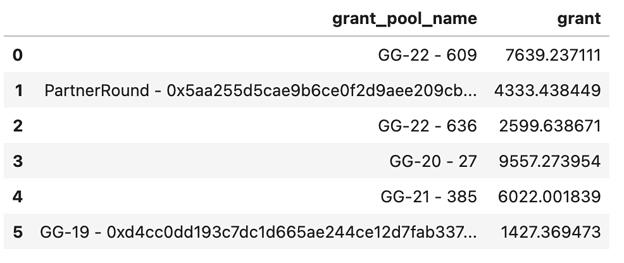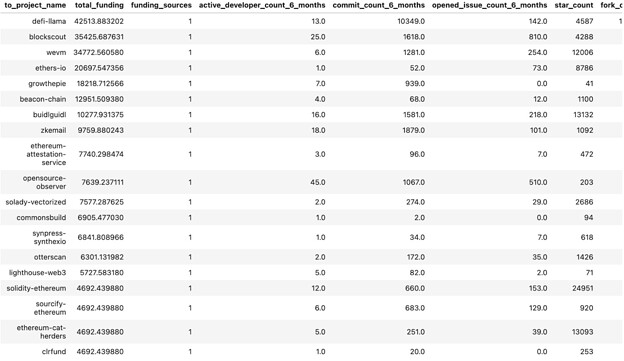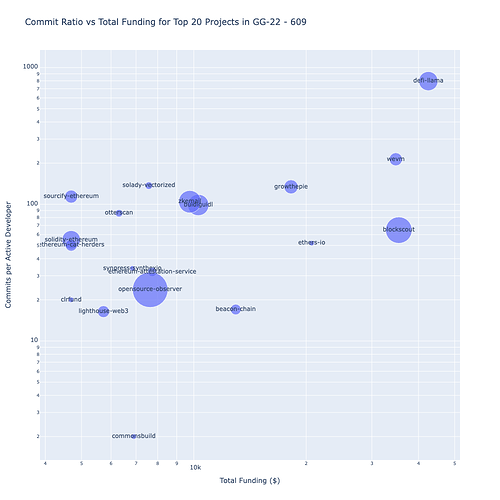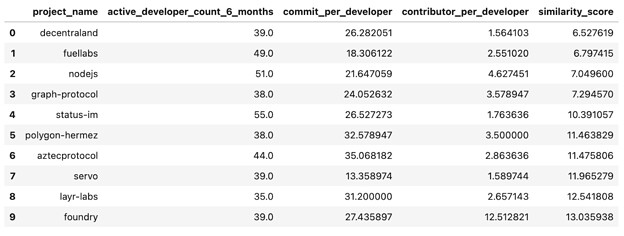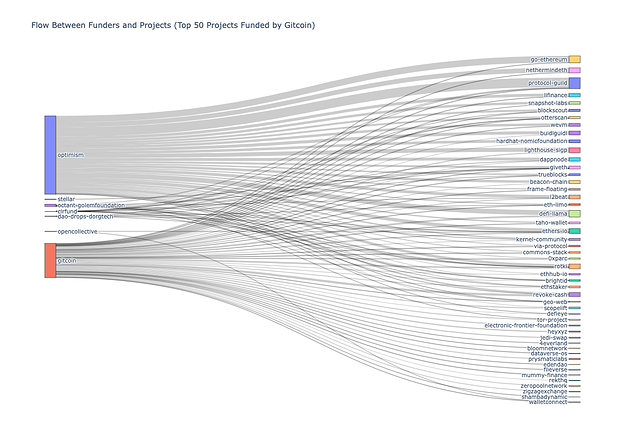Summary
This GCP proposes to fund tighter integration and ongoing use of analytics from Open Source Observer (OSO) to track cohorts of grantees before, during, and after they receive funding from grant programs on Grants Stack. We aim to enhance data infrastructure and develop advanced metrics to improve the grants experience and Gitcoin’s go-to-market strategy.
For this, we are requesting a total of $15K GTC from the Gitcoin treasury, equivalent to $2500/mo over 6 months.
Abstract
Open Source Observer (OSO) analytics provides critical insights into grantee impact by capturing data on open source developer activity. This integration will enable more objective impact scoring, efficient fund tracking, and granular post-funding analysis of grantee performance.
There are two primary components:
-
Infrastructure: Tighter integration and collaboration on improving grants data. Gitcoin would benefit from stronger data infrastructure, but should also keep its team lean and focused on growing GMV. OSO’s model of maintaining public datasets and public ETL infrastructure can reduce Gitcoin’s maintenance burden while opening up additional pathways for the analyst / data science community to work on top of Gitcoin data.
-
Data-driven GTM: Development of more advanced metrics to improve the grants experience and go-to-market. In addition to using more data to screen projects and provide impact metrics on Grants Explorer, there is a backlog of data science work the two organizations would like to pursue together. This includes co-developing new measures of builder quality, project momentum, and round success. Gitcoin wants to use data to improve its GTM strategy, help Round Operators configure their grants programs, and show ROI to funders.
Motivation
The Gitcoin ecosystem requires transparent, data-driven insights into funded projects’ impact. Current challenges include:
- Maintenance of ETL infrastructure
- Lack of automated data collection for grantee performance
- Difficulting joining Gitcoin data on other relevant datasets
- Need for more objective impact metrics, especially back to funders
- Limited visibility into post-funding outcomes
- Difficulty in demonstrating ROI and effectiveness of different allocation strategies
Previously, OSO data demonstrated the impact of Gitcoin Grants on open source developer activity. Snapshots of OSO data have been integrated into the application sign-up and screening. Gitcoin also uses OSO’s free API to surface “impact stats” for OSS projects on Grants Explorer. At the same time, Gitcoin and OSO have worked closely in a variety of other contexts, including the Cartographers Syndicate, Optimism Retro Funding, and the Sunny Awards. OSO also maintains raw and indexed Gitcoin data in its public data warehouse.
By expanding this collaboration, we can provide high-resolution analytics for grant operators and program managers using Gitcoin Grants Stack, improving accountability and attracting new ecosystems to the platform.
This collaboration will result in:
- A single source of truth for Gitcoin project data that’s easy to join on other datasets
- More automated tracking of developer activity
- Standardized impact metrics across the grants lifecycle
- Continuous monitoring of funded projects and cohort-based analysis
- Data-driven insights for program and GTM optimization
Specifications
Work Components
Infrastructure
Existing Infrastructure:
- Allo Indexer and RegenData.xyz as ETL and data warehouse for Gitcoin data
- Regular updates to OSO’s OSS Directory of projects in each Gitcoin grants round
- Gitcoin’s existing backend infrastructure for serving grant and funder data to users
- OSO’s project-artifact registration and mapping system, and events indexer for monitoring code contributions and blockchain transactions related to projects
- OSO’s free API and BigQuery access to metrics (plus easy integration with other public datasets)
New Development:
- Alignment on ETL standards
- Identify the critical data marts to serve business needs
- Ingest and warehouse the necessary (raw) source data, e.g., from Allo Indexer
- Implement schemas for processing and normalizing the data
- Tighter integration and single (public) source of truth for grants data
- Implement consistent project, round, and donor namespacing
- Create automated updates for projects from Grants Stack applications
- Ensure data synchronization and latency requirements are met
Data-driven GTM
- Develop advanced analytics and GTM
- Design v1 “builder quality” and momentum metrics
- Create cohort analysis models for different rounds and categories of projects
- Use metrics to power public dashboards and internal tools, addressing key questions like:
- How has grantee impact evolved before and after receiving funding?
- How do impacts compare across different rounds?
- Predict future impact using historical data to identify high-potential grantees.
- Analyze trends across rounds to refine future funding strategies.
- Collaborate on GTM value proposition and round success metrics
Milestones & Timeline
| Phase | Task | Date |
|---|---|---|
| Phase I | Alignment on ETL standards | Month 1 |
| Phase II | Tighter integration and single (public) source of truth for grants data | Month 2-3 |
| Phase III | Develop advanced analytics and GTM | Month 4-6 |
Budget Breakdown
Total Request: $15K GTC ($2500/month for 6 months).
This effectively covers a portion of time spent by the OSO data & engineering teams. It does not cover any of the infrastructure costs, which will continue to be borne by each organization on its own. There is strong potential for a win-win here, so this GCP provides a springboard for additional work between Gitcoin and OSO in the future.
Note: There may be additional data requirements around metrics and reporting that come from partners and will be budgeted & scoped directly with those partners.
Success Measures
- Infrastructure
- Source data is cleaned up and harmonized
- All active OSS projects are indexed; relevant metrics available on Gitcoin
- Ongoing data coverage and latency requirements are met
- Analytics implementation
- Release of v1 of builder quality and momentum models
- Builder metrics integrated at the application stage and on grants explorer
- Longitudinal analysis of grant cohorts by round and type of project
- Adoption
- Number of round operators using the analytics
- User engagement with dashboards on Gitcoin website
- Use of raw data in data warehouse and via the OSO API
Benefits
- Reduced data infra burden for Gitcoin
- Enhanced decision making for round operators and donors
- Improved transparency and accountability to funders
- High quality and up-and-coming projects receive more funding
- Ecosystem growth and better ROI
Drawbacks & Considerations
- Legacy data migration (eg, from cGrants, Allo v1)
- Integration complexity with existing systems
- Standardization / “hardening” of schemas
- Data quality maintenance and pipeline upkeep
- Finding robust metrics that are resistant to gamification
Out of Scope
The following items are not included in this proposal:
- Impact metrics beyond open source developer activity
- Custom visualizations for specific grant programs
- Data entry for onboarding new ecosystems
- Deep dives / additional data science work

